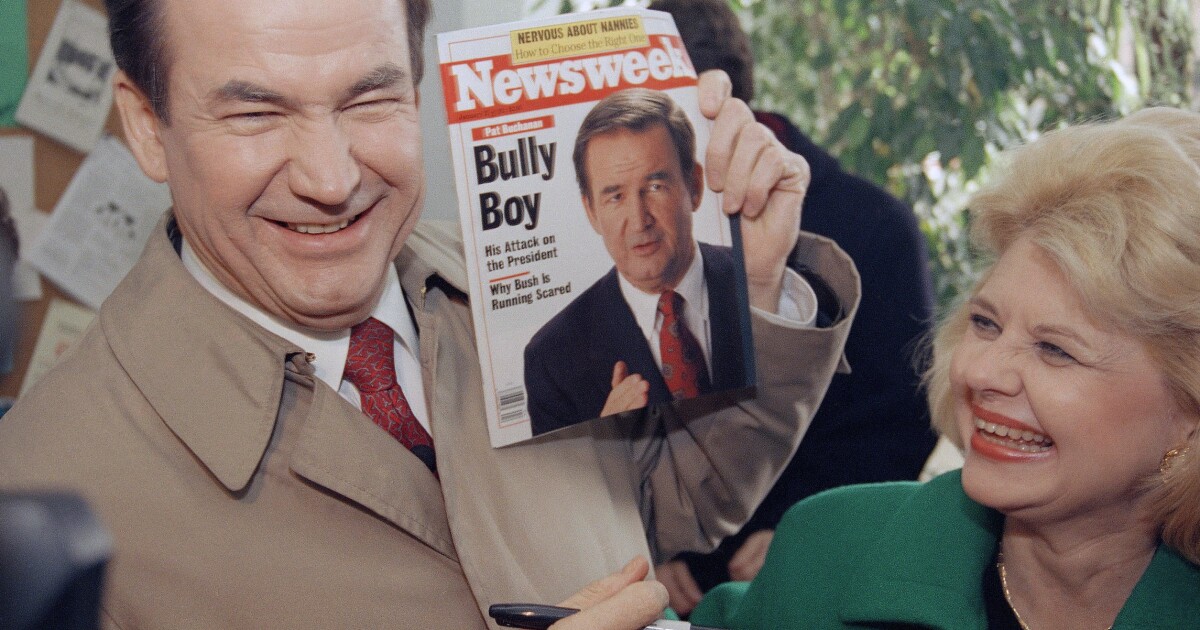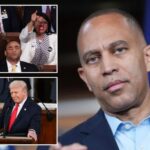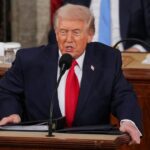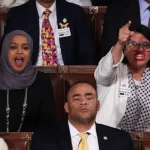

As Republicans struggle through a rocky transition from being the party of business to that of the working class, a conservative pundit whose own trajectory anticipated that transformation 30 years ago is hanging up his pen.
Pat Buchanan has retired from his syndicated column ahead of a presidential election that will test the staying power of a more populist and nationalist conservatism and after a midterm election cycle that demonstrated its growing pains.
In addition to his decades of commentary, Buchanan advised Presidents Richard Nixon and Ronald Reagan as they integrated the “silent majority” into the GOP. He ran for the office three times himself, on a platform similar to the one former President Donald Trump was elected on in 2016.
WHITE HOUSE GOES TO WAR OVER BIDEN CLASSIFIED DOCUMENTS QUESTIONS
“What America first means is we put the national interests of the United States and the well-being of our own country and our own people first. Our foreign policy, first and foremost, should be focused on the defense of American freedom, security and rights,” Buchanan told NPR two days after Trump took office.
It was a phrase widely seen as considered discredited by World War II that Buchanan had been using as far back as his 1990 National Interest essay “America First — and Second, and Third.”
Originally a Cold War hawk and free trade proponent, Buchanan began to espouse a less interventionist foreign policy after the Soviet Union disintegrated and trade policies designed to protect the U.S. industrial base. He rejected the 1990s bipartisan consensus in favor of economic opening with China, dismissing then General Secretary Deng Xiaoping as a “chain-smoking communist dwarf.”
“[Alexander] Hamilton created the ‘American System’ to end our reliance on England and Europe, because he and Washington believed economic independence was necessary for political independence,” Buchanan wrote. “If we did not depend on Europe, they knew, we could stay out of Europe’s wars. Is all that Made-in-China junk at the mall worth the loss of our economic independence?”
“The looting of America for the benefit of foreign regimes ends the day I take office,” read a campaign brochure during Buchanan’s 1996 bid for the Republican nomination. “If we cannot balance our own budget, what are we doing sending billions of tax dollars overseas to balance the budgets of foreign governments?”
That wasn’t the only area where Buchanan foreshadowed Trump’s appeal.
“We need a sea wall to stop the tidal wave of illegal immigration and narcotics sweeping over our southern border,” read the Buchanan campaign brochure. “We need a ‘time out’ on legal immigration — to assimilate and Americanize the millions who have come in recent decades.”
Long before Buchanan began sounding different from a Chamber of Commerce Republican on trade, immigration or foreign policy, he was writing speeches for Spiro Agnew and memos nudging GOP presidents to disaffected blue-collar Democrats.
“They don’t read Adam Smith or Edmund Burke, but they come from the same schoolyards and the same playgrounds and towns as we come from,” Buchanan would say of such voters in his “culture war” speech at the 1992 Republican National Convention. “They share our beliefs and convictions, our hopes and our dreams. They are the conservatives of the heart.”
“Our resolve is to put America First, to make America First again, and to keep America First,” Buchanan wrote during that campaign against President George H.W. Bush. “For 50 years, we have liberated, defended, and aided nations all over the world. It was the right and just thing to do. But, now, we must begin to look out for the forgotten Americans right here in the United States.”
Politico called Trump “Pat Buchanan with better timing.” The New York Times dubbed Buchanan “the man who won the Republican Party before Trump did.” Five days after Trump’s inauguration, New York Magazine printed the headline, “Welcome to the Pat Buchanan administration.”
But the two men briefly squared off for the Reform Party’s presidential nomination ahead of the 2000 election. It was during that campaign that Trump took many of the positions that made Republicans doubt his conservative credentials, especially on social issues. Trump dropped out of the race, Buchanan won the nomination but took just 0.4% of the vote to finish a distant fourth place in the general election.
Almost a quarter of a century later, the Republican Party looks considerably more Buchananite than like the winner of that election, former President George W. Bush. There is an America First Caucus in the GOP-controlled House.
“While many older Republican leaders remain wedded to a Bush foreign policy, some of the prospective leaders of the party seem to be adopting their own versions of ‘America First,’” Buchanan wrote in 2021.
“We’ve turned the Republicans into a working-class party,” is how former Trump White House chief strategist Steve Bannon put it in 2019.
Still, the midterm results demonstrated that the party is a long way from the 49-state landslides of Nixon and Reagan. Republicans are debating a realignment toward the more thoroughgoing social conservatism of Buchanan or the more secular Trump, who appears conflicted about his contribution to reversing Roe v. Wade.
CLICK HERE TO READ MORE IN THE WASHINGTON EXAMINER
The final chapter of this story has yet to be written. But at 84, one of its primary authors is signing off.







